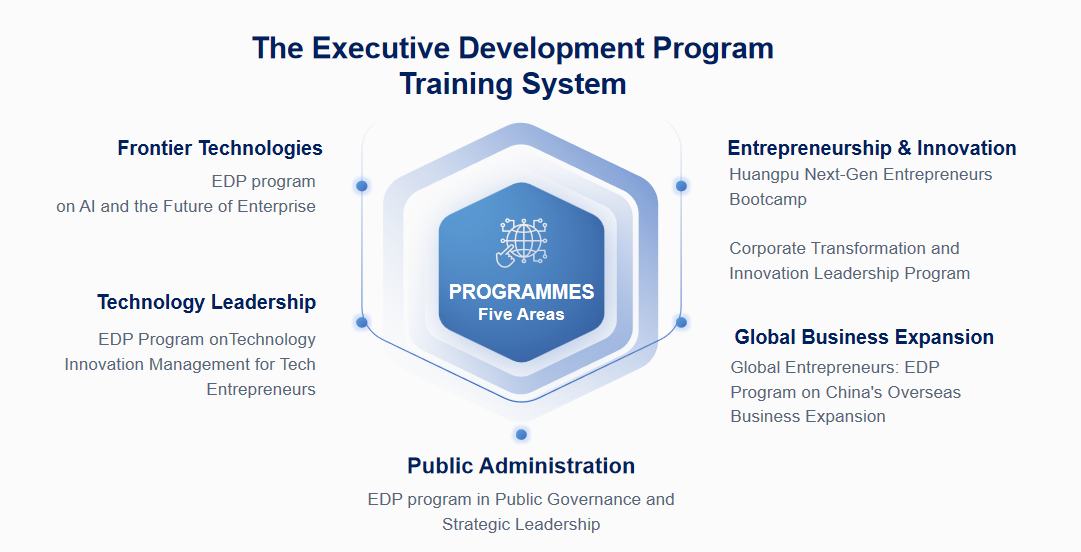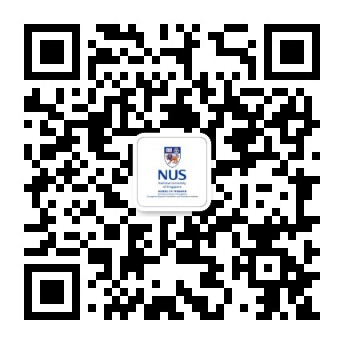The National University of Singapore Guangzhou Research Translation and Innovation Institute (NUS GRTII) is rooted in the Guangdong-Hong Kong-Macao Greater Bay Area. Leveraging NUS's global educational resources and international curriculum system, NUS GRTII is committed to building a high-level capability development platform integrating talent cultivation, strategic services, and innovation practices. As one of its core educational initiatives, the Executive Development Programs (EDP) cater to diverse groups from government, business, and research sectors. These programs are tailored to address regional development priorities and organizational capacity-building needs, offering short-to-medium-term courses focused on practical challenges and future trends.
The EDP program features a "Singapore-Guangdong Collaboration, Contextualized Learning" approach, bringing together chair professors from world-class universities, senior government officials, industry leaders, and corporate experts. Combining theoretical insights with hands-on experience, the courses employ diverse teaching methods such as lectures, seminars, case studies, and field research to help participants develop global perspectives, enhance innovation capabilities, and strengthen management practices.
Customized programs are also available for enterprises and institutions to align with their developmental stages and capability growth objectives. Upon completion, participants will receive an EDP Certificate issued by the NUS GRTII.
Currently, the EDP program has established a curriculum system covering five core areas: "Global Business Expansion, Public Administration, Entrepreneurship & Innovation, Frontier Technologies, and Technology Leadership," supporting regional talent structure optimization and industrial governance modernization.

The EDP programin in five areas of high-quality courses, focusnng on key organizational development priorities in the new era.
Global Business Expansion: Focuses on global economic trends and developments, helping enterprises navigate complex international landscapes and evolving trade rules. For example, strategies and implementation for global expansion amid policies like U.S. tariff hikes. Topics include overseas market entry, international trade compliance, cross-border legal and tax frameworks, localization strategies, and global brand building, with a focus on emerging markets like Southeast Asia and linkages to developed economies such as the U.S., Europe, Japan, and South Korea.
Public Administration: Centers on modernizing governance systems and enhancing regional governance capabilities, addressing the practical needs of government agencies and industrial park managers. Courses cover core issues like public policy design and implementation, urban sustainable development, industrial transformation, digital governance, and social security systems, incorporating Singapore's policy experiences in areas such as business environment development, the Central Provident Fund, and service sector growth. Through thematic lectures, case analyses, and field research, the program helps leaders deepen policy understanding, strategic execution, and systemic governance in public service.
Entrepreneurship & Innovation: Targets young entrepreneurs and early-stage startup teams, building a capability pathway from "0 to 1 to ∞." Courses are flexibly designed around business life cycles, covering product definition, funding pathways, marketing, and accounting in the early stage; strategy execution and team building in the mid-stage; and sustained innovation and growth transformation in the mature stage. Through startup case studies, mentorship, and action learning, the program helps entrepreneurs overcome critical growth challenges and develop sustainable cognitive and decision-making abilities.
Frontier Technologies: Focuses on core technologies and industrial applications of new quality productivity, tailored for policymakers and corporate innovators seeking to deepen their understanding of tech strategy and commercialization. Topics include generative AI, large language models, Web3, quantum technology, and bionic robotics, emphasizing the full pathway from awareness and commercialization to practical application. Through technical deep dives, cross-industry case studies, and collaborative modules, the program enhances organizations' foresight and interdisciplinary synergy in future tech cycles.
Technology Leadership: Centers on elevating organizational management capabilities driven by technological innovation, translating technical perspectives into systemic management competencies and strategic value. The curriculum spans five core modules: technology strategy formulation, trend forecasting methods, intellectual property and global compliance mechanisms, cross-functional and cross-regional collaboration, and outcome translation and organizational mobilization. The program empowers participants to strengthen strategic vision, systems thinking, and execution, enabling role transformation in tech-driven environments.
These five areas synergize to form a high-level curriculum system for the new era. Moving forward, the NUS GRTII will continue advancing integrated innovation in "knowledge linkage, policy insights, and capability translation," fostering a globally competitive talent development ecosystem through a more international, structured, and open curriculum system.
Contact Us
Address: Building B5, China-Singapore Smart Park, Longhu Subdistrict, Huangpu District, Guangzhou, Guangdong Province, China
Email: education@nusgrtii.cn
Telephone: +86-20-82879825-8119


